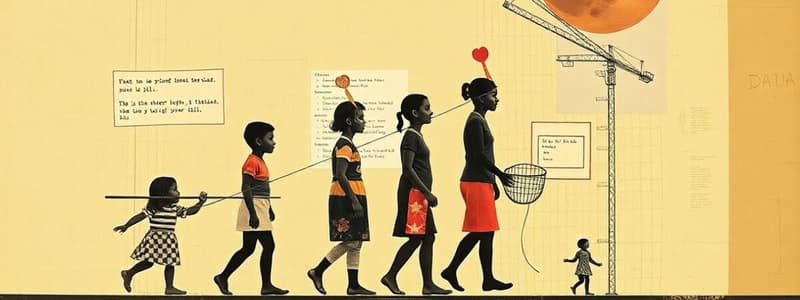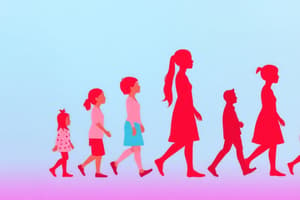Podcast
Questions and Answers
What is the primary focus of the nature-nurture debate?
What is the primary focus of the nature-nurture debate?
- The influence of genetics on behavior
- The roles of culture and education in behavior
- The impact of socioeconomic status on development
- The interaction between inherited traits and environmental factors (correct)
Which statement best describes the concept of multidirectional development?
Which statement best describes the concept of multidirectional development?
- Development is only influenced by childhood experiences
- Development occurs in a straight line toward maturity
- Development can take many different pathways and is influenced by various factors (correct)
- Development refers to a single direction over the lifespan
What defines a critical period in human development?
What defines a critical period in human development?
- A specific stage in life when a behavior must be learned for normal development (correct)
- Any time when development occurs rapidly
- A phase where experience has no effect on development
- A time frame during which a skill is learned perfectly
How does socioeconomic status (SES) influence development?
How does socioeconomic status (SES) influence development?
What role does culture play in psychological development?
What role does culture play in psychological development?
Which aspect describes the concept of plasticity in human development?
Which aspect describes the concept of plasticity in human development?
What is the main tenet of behaviorism in human development?
What is the main tenet of behaviorism in human development?
Which of the following reflects Erikson's perspective on human development?
Which of the following reflects Erikson's perspective on human development?
Which concept highlights the impact of immediate surroundings on a person's development?
Which concept highlights the impact of immediate surroundings on a person's development?
What term refers to the process of reinterpreting old ideas to incorporate new experiences?
What term refers to the process of reinterpreting old ideas to incorporate new experiences?
Which theory emphasizes learning through observing others and the role of self-efficacy?
Which theory emphasizes learning through observing others and the role of self-efficacy?
In the context of human development, what does the term 'critical period' refer to?
In the context of human development, what does the term 'critical period' refer to?
Which component of Bronfenbrenner’s ecological systems approach concerns external contexts that affect development, such as social services and community resources?
Which component of Bronfenbrenner’s ecological systems approach concerns external contexts that affect development, such as social services and community resources?
What is the main focus of cognitive theory in the context of human development?
What is the main focus of cognitive theory in the context of human development?
Which of the following best describes the nature-nurture debate in human development?
Which of the following best describes the nature-nurture debate in human development?
Which perspective emphasizes the importance of cultural context in understanding human behavior and development?
Which perspective emphasizes the importance of cultural context in understanding human behavior and development?
What does the term 'nature' refer to in the nature-nurture debate?
What does the term 'nature' refer to in the nature-nurture debate?
Which of the following best describes the concept of critical or sensitive periods?
Which of the following best describes the concept of critical or sensitive periods?
How is development characterized according to the life-span perspective?
How is development characterized according to the life-span perspective?
What does the term 'cohort' refer to in the context of multidisciplinary development?
What does the term 'cohort' refer to in the context of multidisciplinary development?
Which of the following factors are encompassed within the nurturing aspect of the nature-nurture debate?
Which of the following factors are encompassed within the nurturing aspect of the nature-nurture debate?
What is a common misconception about the continuity of development?
What is a common misconception about the continuity of development?
Which aspect reflects the multicontextual nature of development?
Which aspect reflects the multicontextual nature of development?
Which theory suggests that human development occurs in stages over time?
Which theory suggests that human development occurs in stages over time?
Flashcards
Socioeconomic Status (SES)
Socioeconomic Status (SES)
A person's position in society based on income, wealth, occupation, education, and residence.
Culture
Culture
Patterns of behavior passed down through generations.
Ethnic Group
Ethnic Group
People with shared ancestry, region of origin, often language, culture, and religion.
Plasticity in Human Traits
Plasticity in Human Traits
Signup and view all the flashcards
Mirror Neurons
Mirror Neurons
Signup and view all the flashcards
Developmental Theory
Developmental Theory
Signup and view all the flashcards
Psychoanalytic Theory
Psychoanalytic Theory
Signup and view all the flashcards
Erikson's Stages
Erikson's Stages
Signup and view all the flashcards
Classical Conditioning
Classical Conditioning
Signup and view all the flashcards
Operant Conditioning
Operant Conditioning
Signup and view all the flashcards
Social Learning Theory
Social Learning Theory
Signup and view all the flashcards
Modeling
Modeling
Signup and view all the flashcards
Self-Efficacy
Self-Efficacy
Signup and view all the flashcards
Cognitive Theory
Cognitive Theory
Signup and view all the flashcards
Assimilation (Piaget)
Assimilation (Piaget)
Signup and view all the flashcards
Accommodation (Piaget)
Accommodation (Piaget)
Signup and view all the flashcards
What is the goal of the Science of Human Development?
What is the goal of the Science of Human Development?
Signup and view all the flashcards
What are the basic steps of the scientific method?
What are the basic steps of the scientific method?
Signup and view all the flashcards
Nature vs. Nurture
Nature vs. Nurture
Signup and view all the flashcards
What is a critical or sensitive period?
What is a critical or sensitive period?
Signup and view all the flashcards
Multidirectional Development
Multidirectional Development
Signup and view all the flashcards
Multicontextual Development
Multicontextual Development
Signup and view all the flashcards
What is a cohort?
What is a cohort?
Signup and view all the flashcards
Study Notes
Introduction to the Science of Development
- This chapter introduces the science of human development
- It aims to understand how and why people of all ages change over time.
Assessment
- Presentation: 15%
- Group Assignment: 15%
- Individual Assignment: 15%
- Mid-term exam: 20%
- Final exam: 40%
- Total: 100%
- Continuous Assessment: 20% x 60
- Final: 20% x 40
- Compulsory pass mark of 20% for each assessment
References
- Santrock, J. W. (2021). Life-span development (18th ed.). McGraw-Hill.
- Santrock, J. W. (2022). Essentials of life-span development. McGraw-Hill Education.
- Papalia, D. E., & Martorell, G. (2021). Experience human development. McGraw-Hill Education.
- Gillibrand, R., Lam, V., & O'Donnell, V. L. (2016). Developmental psychology. Pearson Education Limited.
Defining Development
- The science of human development seeks to understand how and why people, of all ages and from all walks of life, change over time.
Understanding How and Why
- Five basic steps of the scientific method:
- Pose a question based on theory, prior research, or observation
- Develop a testable hypothesis
- Gather empirical evidence (data)
- Draw conclusions and either support or refute the hypothesis
- Report the results and alternative explanations
The Nature-Nurture Debate
- Nature: Influence of genes inherited
- Nurture: Environmental influences (e.g., mother's health, family, school, community, society)
Critical/Sensitive Periods
- A critical or sensitive period is a time when specific experiences have a significant impact on later development.
The Life-Span Perspective
- Multidirectional: Human characteristics change in various directions over time.
- Stages: Some theorists describe development in stages (e.g., Freud, Erikson, Piaget).
- Continuous: Others view development as a continuous process.
- Multicontextual: Development occurs within multiple contexts:
Historical Context
- Cohort: Group of people born within a few years of one another, sharing similar historical experiences.
Socioeconomic Context
- Socioeconomic status (SES): A person's position in society, determined by income, wealth, occupation, education, and residence.
Development Is Multicultural
- Culture: Shared patterns of behavior passed from one generation to the next
- Vygotsky: Described the interaction between culture and education
- Ethnic group: People whose ancestors come from the same region, share a common language, culture, and religion.
Development Is Multidisciplinary
- Genetics and neuroscience are important disciplines in lifespan research.
- Every trait (psychological and physical) is influenced by genes.
Development Is Plastic
- Human traits can be shaped, but people maintain a certain level of consistency.
- Mirror neurons: Brain cells that respond to actions performed by others as if the observer had performed the action.
Theories of Human Development
- A developmental theory provides a framework for understanding how and why people change as they get older.
Psychoanalytic Theory
- A theory emphasizing the role of irrational, unconscious drives and motivations, often originating in childhood, on observable behavior.
- Sigmund Freud (1856-1939) developed this theory
Erik Erikson's Stages
- Developed eight stages of psychosocial development, each characterized by a specific developmental crisis (1902-1994).
- First five stages builds upon some aspects of Freud's theory, but include three other stages for adults.
Behaviorism
- A theory focused on observable behavior.
- Learning theory: Explains how behaviors are learned.
- Conditioning: Processes by which responses become linked to particular stimuli.
Classical Conditioning
- Ivan Pavlov (1849-1936) developed classical conditioning.
- A learning process where a neutral stimulus is associated with a meaningful stimulus, leading to a similar response to the neutral stimulus.
Operant Conditioning
- B.F. Skinner (1904-1990) developed operant conditioning.
- A learning process where a particular action is followed by either a desired reward (making the action more likely to occur) or an undesirable consequence (making the action less likely).
Social Learning Theory
- Albert Bandura (b. 1925): An extension of behaviorism that emphasizes the influence of other people on behavior.
- Modeling: People learn by observing and copying others.
- Self-efficacy: Belief in one's ability to influence or change outcomes.
Cognitive Theory
- Thoughts and expectations significantly affect actions (Jean Piaget, 1896-1980).
- Focuses on changes in how people think over time.
Piaget's Stages of Cognitive Development
- Different stages for understanding the world by using senses and motor abilities.
Assimilation and Accommodation
- Assimilation: Interpreting new experiences to fit existing ideas.
- Accommodation: Restructuring existing ideas to include new experiences.
Systems Theory
- Change in one aspect of a person, family, or society affects other aspects of development.
- Bronfenbrenner's ecological systems approach: Considers the person within all their contexts and interactions.
Five Components of Bronfenbrenner's System
- Microsystem: Immediate surroundings (family, peers)
- Mesosystem: Connections between settings (e.g., home and school)
- Exosystem: Local institutions (e.g., school, church)
- Macrosystem: Larger social setting (e.g., cultural values, economic policies)
- Chronosystem: Changes over time that affect the other systems
Using the Scientific Method: Observation
- Researchers record behavior systematically and objectively.
- Naturalistic or laboratory settings are used to observe.
Using the Scientific Method: Experiment
- Experiments establish causal relationships among variables.
- Independent variable: The variable manipulated by the researcher.
- Dependent variable: The variable measured to see if it changes in response to the independent variable.
- Experimental group: Receives the treatment.
- Comparison/control group: Does not receive the treatment.
Using the Scientific Method: Longitudinal Research
- Data collected repeatedly on the same individuals over time.
Using the Scientific Method: Cross-Sequential Research
- Study several groups of differing ages and track them over time (combining cross-sectional and longitudinal approaches).
Using the Scientific Method: The Survey
- Collecting information from a large number of people through interviews, questionnaires, or other means.
Cautions from Science: Correlation and Causation
- Correlation: A relationship between two variables.
- Positive Correlation: Both variables increase or decrease together.
- Negative Correlation: One variable increases while the other decreases.
- Zero Correlation: No relationship between variables.
- Correlation does not equal causation.
Ethics
- Researchers must ensure that participation is voluntary, confidential, and harmless.
- Informed consent: Subjects must understand the research procedures and risks involved.
- Confidentiality: Data must be kept private.
- Debriefing: Participants learn the purpose and methods of the research.
- Deception: Sometimes necessary, but only when unavoidable. If used, subjects must be debriefed.
Studying That Suits You
Use AI to generate personalized quizzes and flashcards to suit your learning preferences.




